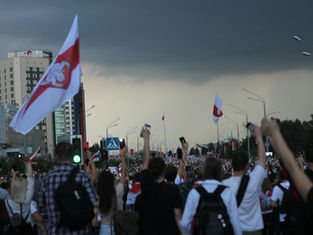top of page
Articles


Mary Wollstonecraft’s Political Philosophy: In Conversation with Sylvana Tomaselli
Sylvana Tomaselli is a historian and lecturer in political philosophy at the University of Cambridge, where she is a fellow of St John’s...

Maria Stella Sendas Mendes
10 min read


A Symphony of Defiance: How Music Spearheads Sikh and Punjabi Articulations of Political Resistance
Bury [music] so deep under the earth that no sound or echo of it may rise again. —Attributed to the Mughal Emperor Aurangzeb[1] Over...

Jeevan Singh Riyait
8 min read


Capturing the Truth
On 11 September 2001, as I walked to the Rome bureau of The New York Times , I stopped in a café on the Campo di Fiori to see why a...

James Hill
11 min read


Freedom of Expression in Belarus after the 2020 Election
auferre, trucidare, rapere, falsis nominibus imperium, atque, ubi solitudinem faciunt, pacem appellant (To ravage, to slaughter, to usurp under false titles, they call empire, and where they make a desert, they call it peace.) —Tacitus, Agricola Despite having a democratic constitution, Belarus has never been a democratic country, before or after the 2020 presidential elections. This has not stopped the authorities stating otherwise. Alyaksandr Lukashenka came to power amid

Volha Siakhovich
16 min read


New Technology, Ancient Battle
Since the detection of massive Russian interference in the 2016 American presidential election, there has been a morass of studies analysing the manipulation, fakes, and distortions, particularly on the Internet, which seem to assault the very notion of truth. In the US, we have been horrified and perplexed by the huge numbers of people who believed, without much evidence, that there had been massive fraud in the 2020 presidential election, of whom hundreds attacked the bui

Askold Krushelnycky
11 min read


Theory and Politics under Technofeudalism: In Conversation with Yanis Varoufakis
As a theorist, economist, politician, author, and co-founder of two transnational democratic and progressive movements, Yanis Varoufakis is a political Renaissance man who has captured some of the main social, political, and economic movements of our times. He catapulted to fame as Greek finance minister in 2015 where he displayed a strong opposing voice to European powers in a time of turbulent financial crisis. Varoufakis has continued to be a leading voice for change. In 2

Teresa Turkheimer
29 min read


John Hume: The Achievement and Limitations of a Man in War
I have not read all the tributes that have been made to John Hume since his death in 2020, but I doubt if many—perhaps any—of them have got to the heart of his real achievement, which was twofold. On the one hand, he prevented a settlement of Northern Ireland’s constitutional status that seemed to be a real possibility in the late seventies and early eighties on what might have been called ‘Unionist’ principles (though it could have resulted in the end, or radical decline, of

Peter Brooke
20 min read


The Twenty-First Century: A Bumpy Ride
Introduction COVID-19 should not have struck us so unawares: similar viruses, SARS and MERS, had emerged within the last 20 years, and global pandemics had been widely discussed. So why were even rich countries so unprepared? It’s because politicians and the public have a local focus. They downplay the long-term and the global. They ignore Nate Silver’s maxim: ‘The unfamiliar is not the same as the improbable.’ Indeed, we’re in denial about a whole raft of newly emergent th

Lord Martin Rees
18 min read


The Many Forms of Vaccine Hesitancy
The COVID-19 pandemic has led to more than 176 million confirmed cases and over 3.8 million confirmed deaths. These numbers are likely dwarfed by the true rates of infection and death, which will remain unknown well into the future and will likely never be fully elucidated.[1] During this time, several countries have vied for the unhappy honour of being the worst affected by the pandemic, including Italy in early 2020, the United States through 2020 and early 2021, and most r

Amar Sarkar
25 min read


The Visit of Czarevitch Nicholas Alexandrovitch to Lahore, January 1891
The below is adapted from Fakir Aijazuddin's 2021 book Imperial Curiosity: Early Views of Pakistan, 1845-1906 . Introduction The nineteenth century was a period of imperialist expansion. Powerful countries in Europe like Great Britain, Germany, and Russia recognized the potential of countries in the near and far East—potential for travel, for tourism, for the advancement of scientific knowledge, for trade, and perhaps most important of all, resources with which to fuel thei

Fakir Aijazuddin
19 min read


John Morley and India: Anti-Imperialist Thought in Practice
The recent upsurge of interest in the history of the British Empire has produced a wealth of literature that often presents empire and imperialism in a hegemonic light, couched in a dichotomy that sets the ‘oppressor’ against the ‘oppressed’, the ‘coloniser’ against the ‘colonised’, and so on. Underpinning fashionable postcolonial discourse, this binary terminology can obscure important nuances of political thought in its proper historical context, such as how prominent figur

Matthew Fisher
31 min read


Arts, Excellence, and Warranted Self-Respect
Funding for the arts is quite frequently commended by political philosophers and political pundits—whom I shall call ‘edificatory perfectionists’—as a policy that can incline people to improve their ways of life by taking advantage of cultural opportunities.[1] By contrast, this article advocates such funding because it can promote the occurrence of outstanding achievements and thereby help to bring about the conditions under which every citizen can be warranted in feeling a

Matthew H Kramer
44 min read


Installation Address, 26 August 2020
The months since my investiture have been remarkable in a number of ways. First and foremost, the continuing pandemic has changed the way my office engages with the public, replacing the in-person contact of what is traditionally a highly social role with virtual gatherings. At the same time, I find myself in a unique position to see and celebrate the innovation and strength with which individuals and organizations are responding to the challenges of the day. My goal, as we m

Salma Lakhani
10 min read


Global Crises and the Community of Democracies
There are certain global issues that pay no attention to national borders or natural barriers: climate change; the COVID-19 pandemic; nuclear weapons proliferation; and a migration and refugee crisis. These challenges can only be met by collective action. This demand binds every country to a multilateral system, but the current global framework is showing its age 76 years after the creation of the United Nations. To be sure, the network should keep out no one: even authorit

Thomas Garrett
13 min read


The Sustaining Cosmos
There are more things in heaven and earth, Horatio, Than are dreamt of in your philosophy. —William Shakespeare, Hamlet (1.5.167–68),...
Jonathan Jones
7 min read


Towards a Cosmic Humanism
When writing critically about the Russian avant-garde, one finds oneself inexorably drawn towards cosmism, as inexorably as the Earth...

Boris Groys
10 min read


Art in Exile at Home: The National Palace Museum, Taiwanese Identity, and China’s Imperial Collection
Between December 1949 and February 1950, three shipments, carrying a total of 3,824 crates of artefacts and artworks from the Qing...

Jean-Michaël Maugüé
11 min read


Beyond Repatriation: The Need for Sensitive Museum Display of Indigenous Objects
Many significant cultural objects have found uncomfortable homes in museums across the world.[1] They have been trapped behind glass,...

Piper Whitehead
13 min read


Enclosing or Democratising the AI Artwork World
Introduction Artificial intelligence (AI)-enabled prediction algorithms create multiple challenges to existing ideas about human agency and how the results of this agency may be governed. Weak or absent transparency in the operation of computational systems is changing the meaning of individual autonomy as AI enables vast numbers of new capabilities previously designed and implemented by humans.[1] The prevailing wisdom is that AI innovation is best driven by commercial mar

Robin Mansell
16 min read


The Link between British Perceptions of Party Ideological Positions and Electoral Outcomes, 2017-20
Abstract In the wake of successive disappointing election performances by the UK Labour Party, commentators on the party’s centre-right...

Colin Kaljee
20 min read


Politicising the Apolitical: Abstract Expressionism and the Cold War
Abstract Expressionism emerged amid a tense post-war climate, as a new genre of art that seemed so devoid of representational form or meaning that it could not be political. However, it was precisely this apparent apoliticality that made it so intensely political. Historiography on the topic has followed what I am inclined to call a ‘top-down’ trend. As outlined by Eva Cockcroft and Frances Stonor Saunders, those in power consciously used the art of the Abstract Expressionist

Mina Polo
10 min read


Something to Write Home about: Postcards of Donbas, Postcards as Donbas
Postcards have long been linked to memory formation, sold primarily as ‘souvenirs’, a term itself deriving from the French verb souvenir...

Alice Mee
10 min read


The Politics of NHS Spending
The UK’s National Health Service (NHS) was set up in 1948 following the 1942 Beveridge report, a cross-party report which established its...

Fatima Osman
6 min read


Making BBC Four’s African Renaissance: In Conversation with Russell Barnes and Clare Burns
Russell Barnes is a Director and Producer for the documentary production company ClearStory. Clare Burns has worked in television...

Helen Grant
10 min read
bottom of page

